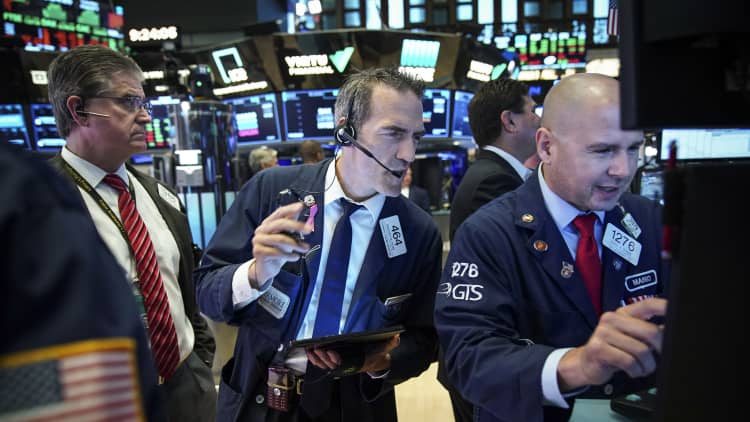
The Dow Jones Industrial Average recovered the bulk of a nearly 600-point drop on Wednesday as a sharp decline in bond yields stabilized to temper worries over slowing economic growth.
The 30-stock index closed 22.45 points lower, or 0.1% at 26,007.07. At its lows of the day, the Dow had fallen more 589.13 points. The Nasdaq Composite advanced 0.4% to 7,862.83, led by Apple, after the tech-heavy index fell as much as 1.7%. The S&P 500 eked out a small gain after dropping nearly 2%, climbing 0.1% to 2,883.98. This was the S&P 500's biggest intraday comeback of the year.
The 10-year Treasury yield traded around 1.71%. The benchmark rate briefly dipped below 1.6% earlier in the day to hit a 2016 low.
Stocks also bounced off their lows as the Chinese yuan's fall against the U.S. dollar was curbed. The yuan traded around 7.06 per dollar on Wednesday. The currency bounced off its session low against the dollar around 9:45 a.m. ET, around the same time the major stock indexes started to pare losses.
"When we started getting the headlines with China, institutions needed some time to make their moves and reposition. I think we've priced in all the headlines that have been coming out," said Michael Katz, partner at Seven Points Capital. "If we get more headlines and back and forth between China and the U.S., I think we head back lower. But right now everything seems to be priced in. If we don't get any more headlines, I think that takes some pressure off the market."
Still, concerns over global growth remained as gold traded at fresh multiyear highs and trade fears lingered.
"Yields are collapsing and gold is soaring," said Peter Cardillo, chief market economist at Spartan Capital Securities. "That's raising concern about the impact of the trade war on the economy."
"Investors need to be prudent and cautious here," he said.
Gold jumped more than 2%, marking the first time since 2013 the metal traded above $1,500. Its year-to-date gains have also surpassed those of the S&P 500.
"On top of that you're seeing more and more money going into German bunds ... that's going to scare people because they're continuing to move money – at the end of last year there was $8 trillion in negative yields. Currently right now we're at $15 trillion in negative yields," said Jeff Kilburg, CEO of KKM Financial.
The yield on the 10-year German bund briefly fell to negative 0.6%, a record low.
Bank stocks, including J.P. Morgan Chase and Bank of America, fell as they are the one sector with the most to lose from falling interest rates. J.P. Morgan shares slid 2.1% while Bank of America dropped 1.9%. Citigroup and Wells Fargo both traded more than 1% lower.
China also set a weaker-than-expected yuan level overnight, adding to the investor concerns. That is what caused the market to sell-off on Monday.
China on Monday let its currency fall to its lowest level in more than a decade against the U.S. dollar, with the yuan breaking below 7 per U.S. dollar and triggering the worst sell-off of the year on Wall Street. China insists, however, the move was not in response to the newly announced tariff. Equities rebounded on Tuesday when China stabilized the currency.
Dryden Pence, chief investment officer at Pence Wealth Management, said China had to stabilize its currency because devaluing it would go against its goal of becoming a reserve currency. He also noted this sell-off is a good buying opportunity for investors.
"The market was waiting for a place to pull back from and we got it," Pence said. "We're probably going to find ourselves in this pattern: You get down between 10% and 12% and then you get a recovery."
Tensions between China and the U.S. have been rising since last week, when President Donald Trump announced a 10% tariff on an additional $300 billion worth of Chinese goods.
"Every day, companies are moving out of China and it's not like they're coming back. So the longer this trade dispute goes on, the bigger problem they have," Pence said. "If your competitive advantage is cheap labor, that only works until someone else has cheaper labor."
The trade war between China and the U.S. has been going on for more than a year. Investors have been worried about its ramifications in terms of global growth and corporate profits. Some central banks have even started cutting interest rates amid these pressures.
Overnight, New Zealand, India and Thailand all cut interest rates. The Federal Reserve had cut rates last week by 25 basis points.
In corporate news, Disney shares slid on weaker-than-expected results for the previous quarter. Disney's results were weighed down by increasing losses in streaming services such as Hulu, ESPN+ and Disney+. The media giant also blamed the integration of Fox's entertainment assets for the weak numbers. Disney shares closed down 5%.
—CNBC's Sam Meredith and Michael Sheetz contributed to this report.


